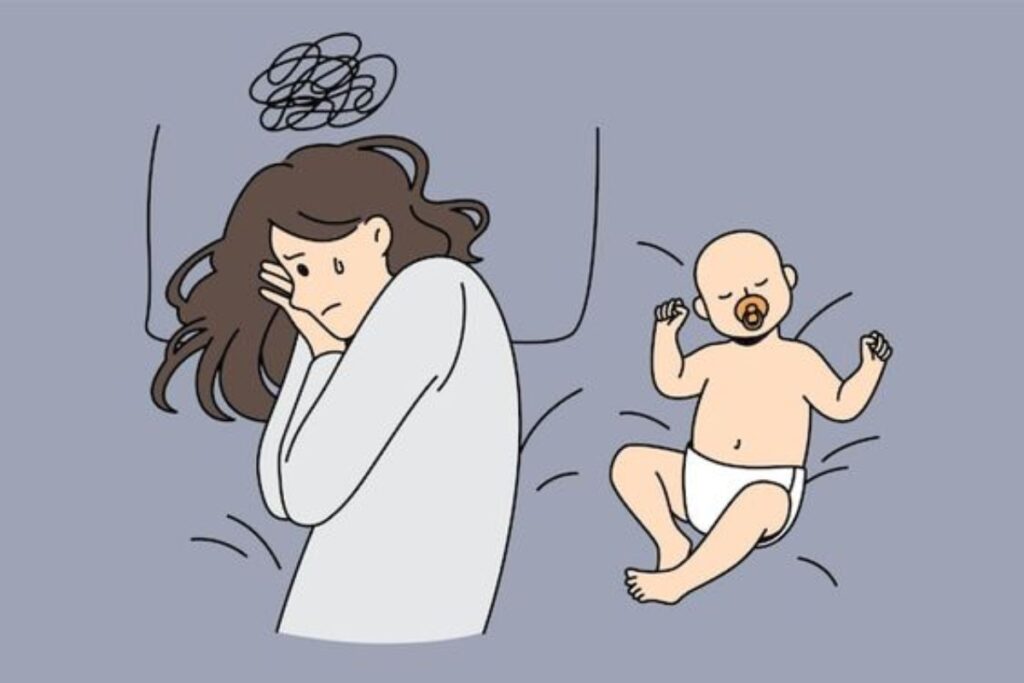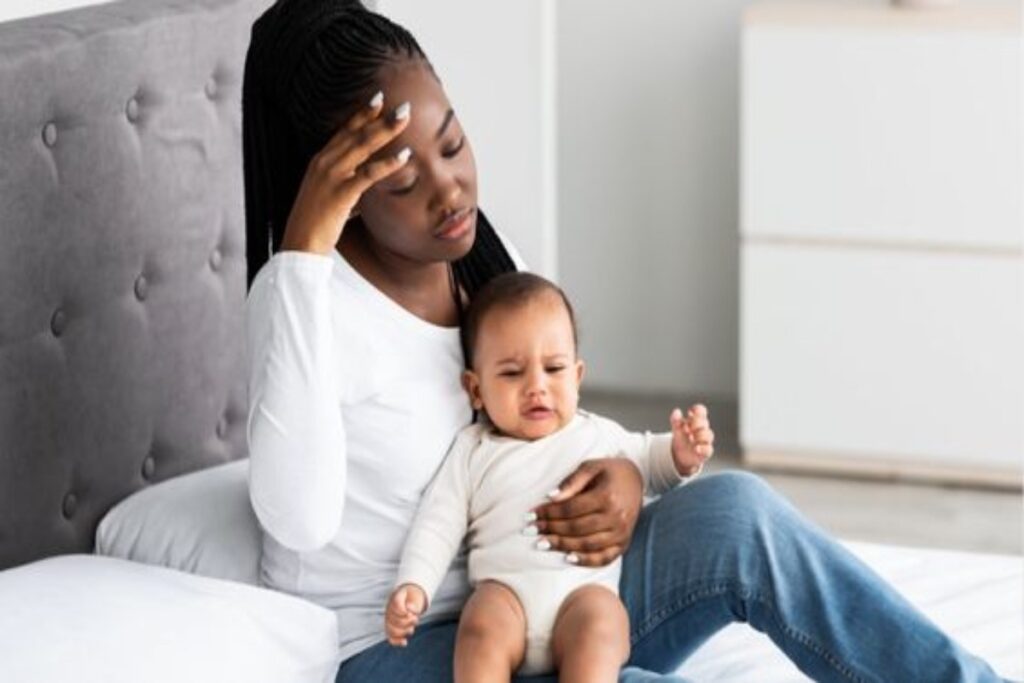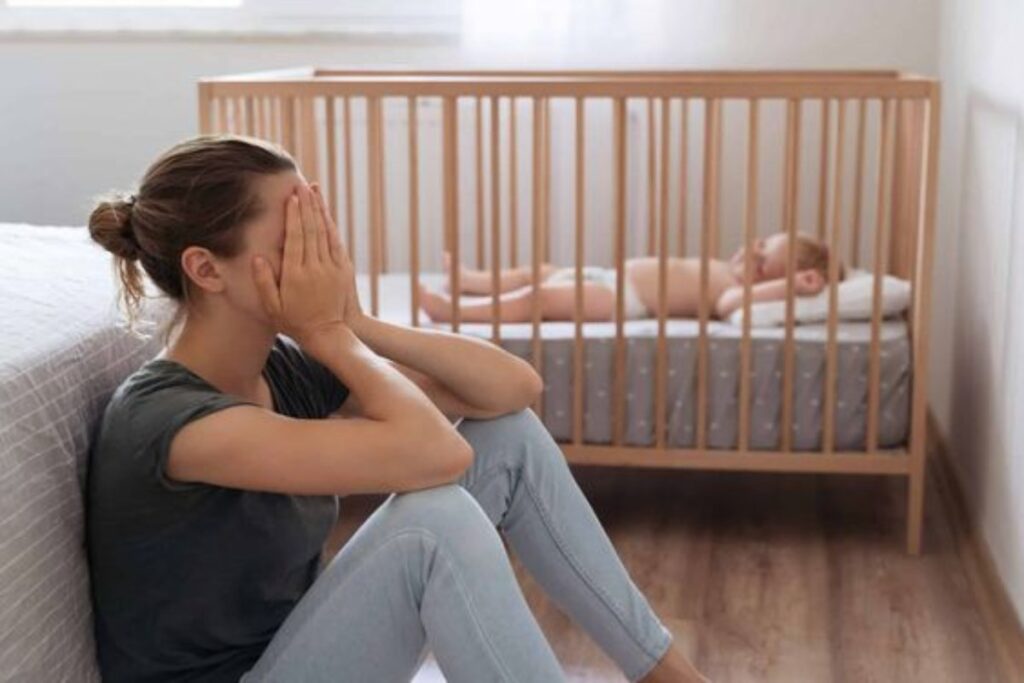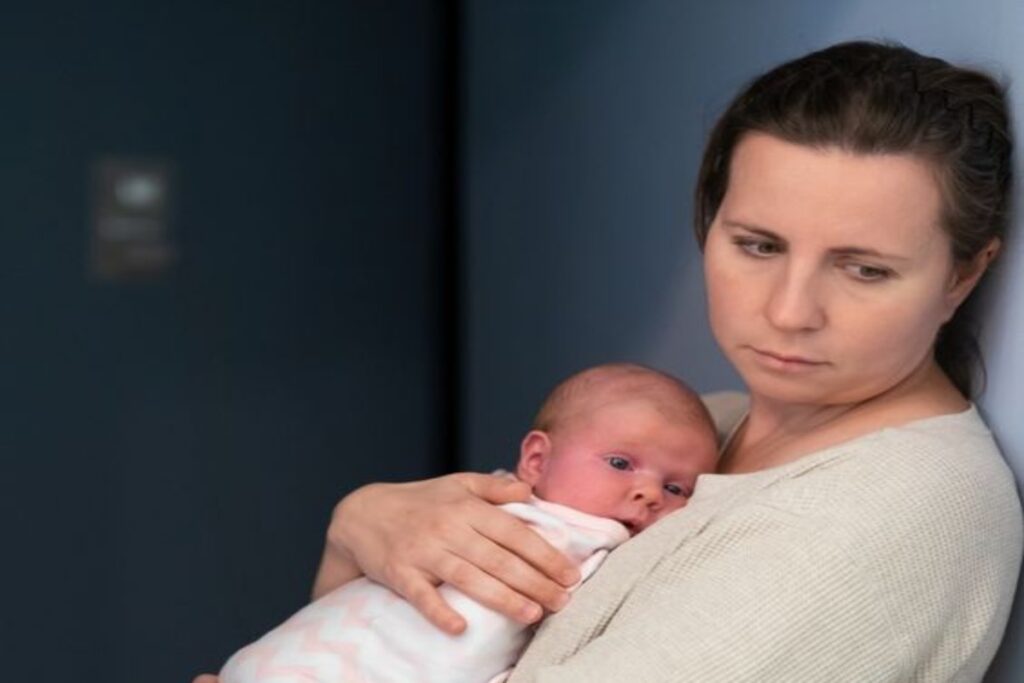
Postpartum depression is a type of depression that develops after having a baby, affecting approximately 15% of nursing mothers. Consequently, people suffering from postpartum depression tend to endure emotional ups and downs.
Postpartum depression also comes with frequent sobbing, weariness, guilt, and anxiety, and as such, they may struggle to care for their newborn. It is a condition that develops following childbirth, with symptoms ranging from moderate to severe.
In rare circumstances, the symptoms are severe enough to jeopardize the mother’s and infant’s health and well-being. However, postpartum depression can be effectively treated with medication and counseling.
Most episodes of postpartum depression occur within 4 to 8 weeks following the baby’s birth. People with postpartum depression feel intense grief, worry, and fatigue, making daily tasks challenging, like self-care and caring for others.

What Does Postpartum Depression Look Like?
Postpartum depression (PPD) is a kind of depression that develops post-delivery. However, PPD is not only exclusive to the person giving birth but also to surrogate and adoptive parents. This is because having a baby comes with many hormonal, physical, emotional, economic, and social changes.
ALSO READ: Singer Victoria Monét Confirms Split From Boyfriend John Gaines
There are three different types of postpartum mood disorders, with symptoms varying accordingly. The first type of PPD is known as postpartum blues or baby blues, which affects about 50% to 75% of people post-delivery.
To identify people with baby blues, the first symptom is crying frequently for no apparent reason, as well as feeling unhappy and anxious. Baby blues commonly appear in the first week, within one to four days after delivery.
Despite the discomfort, the ailment typically resolves within two weeks without therapy. The second type is postpartum depression, which is a much more serious disorder, that affects one in every seven new parents.
If you have previously experienced postpartum depression, your risk increases by 30% with each subsequent pregnancy. You may experience mood swings, frequent sobbing, irritability, and exhaustion, as well as feelings of guilt, anxiety, and incapacity to care for your infant or yourself.
Symptoms range from moderate to severe and might emerge within a week of delivery or progressively over time up to a year later. Although symptoms may last for months, psychotherapy or antidepressants are highly effective treatments.
The last type of PPD is known as postpartum psychosis. Postpartum psychosis is a severe form of postpartum depression that requires immediate medical care. This type of PPD is an uncommon disorder, affecting one in every 1,000 persons following delivery. The symptoms usually begin shortly after delivery and are severe, lasting a few weeks to several months.

What Is the First Stage of Postpartum Depression?
The postpartum period is divided into three different but continuous periods, with the first stage coming within the first 6–12 hours after childbirth. During this time, there is a risk of unexpected crises such as eclampsia, uterine inversion, amniotic fluid embolism, and postpartum hemorrhage.
POLL—Should Abortion Be Legal in Most Cases?
The second stage is the subacute postpartum phase, which lasts two to six weeks. During this phase, the body experiences significant changes in metabolism, genitourinary healing, hemodynamics, and emotional state.
However, compared to the acute postpartum phase, the changes occur more slowly, and the patient can usually recognize concerns on their own.
These could range from common worries about pain in the perineum to severe postpartum depression or peripartum cardiomyopathy. The third stage, known as the delayed postpartum period, can extend for up to six months. Pathology is uncommon at this phase, and changes occur very gradually.

What Happens if Postpartum Depression Goes Untreated?
Within a month or two of the baby’s birth, the majority of perinatal depression episodes start. If left untreated, PPD can cause a chronic depressive condition that impacts both the parents and the child. Future major depressive episodes may be more likely in people with PPD, even after treatment.
PPD also causes stress for the whole family because it can even affect children. Untreated parental depression may cause children behavioral and emotional problems like eating disorders, sleep issues, delayed language development, and excessive crying.
If left untreated, postpartum depression (PPD) can have detrimental effects on relationships, physiology, parenting, and health behaviors. This puts the spouse, the baby, and the entire family at risk.

How Do You Fix Postpartum Depression?
Treatment and recovery time vary according to the severity of your depression and your specific demands. If you have an underactive thyroid or an underlying issue, your doctor may treat it or refer you to a specialist. Your healthcare practitioner may also recommend you to a mental health specialist.
WATCH: Little But Exceptionally Important Life Hacks That Seem to Work for People
Discussing your problems with a psychiatrist, psychologist, or other mental health expert may be helpful. Therapy can help you better cope with your emotions, solve problems, make realistic objectives, and respond positively to situations.
Although bipolar disorder and depression have many similarities, they are inherently different. It is important to know the differences to know the adequate treatment to be used.
You Might Also Like:
Turkey Leg Hut Closed for Food Safety Issues
Madonna Attends Milan Fashion Week in Style
Jamie Foxx’s Daughter Corinne Foxx Is Married! Who Is the Lucky Man?
Singer Victoria Monét Confirms Split From Boyfriend John Gaines
